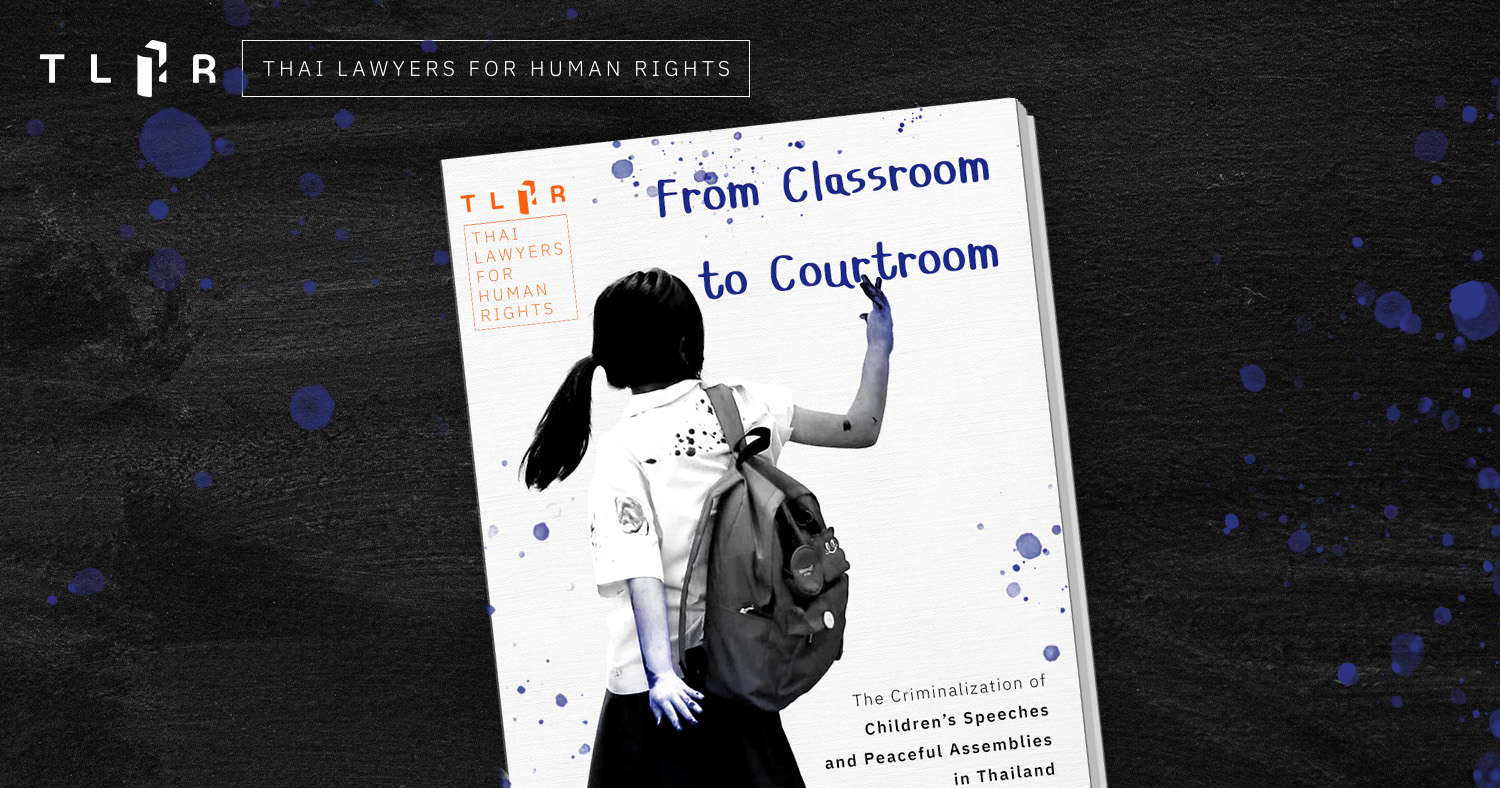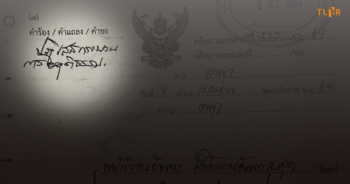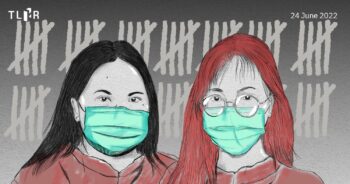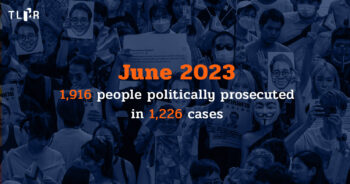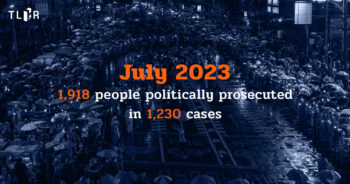In commemoration of National Children’s Day in Thailand on 13 January 2024, Thai Lawyers for Human Rights (TLHR) is releasing a report on children’s rights, From Classroom to Courtroom — The Criminalization of Children’s Speeches and Peaceful Assemblies in Thailand. This report reveals that the criminalization of the rights to freedom of expression and assembly in Thailand following the pro-democracy demonstrations organized primarily by students and young people in 2020 has not spared children. Between 18 July 2020 and 30 November 2023, at least 286 children have been charged and/or prosecuted in 217 cases in connection with the exercise of their rights to freedom of expression and peaceful assembly.
From Classroom to Courtroom provides a deep dive on the use of lèse-majesté law against children, featuring case studies of child activists charged with lèse-majesté, in addition to a comprehensive critical analysis of Thailand’s child justice system, including the arrest of children, the detention of children, and the “special measures” or diversion system to which only some children are eligible.
Methodology
Since its founding in 2014, TLHR has provided free of charge legal assistance and representation to individuals in Thailand, including young people and children, charged under repressive legislation for exercising their rights to freedom of expression and peaceful assembly. TLHR has also utilized international human rights mechanisms to advocate for the rights of children in Thailand, including submissions to the UN Special Procedures.
From Classroom to Courtroom draws on the firsthand experiences of TLHR lawyers and officers who have advocated for the rights of children in Thailand for the past three years, revealing legal challenges to which children are subjected both inside and outside the courtroom. This report also incorporates feedback that child activists, who have faced judicial and non-judicial harassment, have shared with TLHR during routine interviews and two child consultations in November 2022 and October 2023.
Use of Lèse-Majesté Law Against Children
In response to growing criticisms of the monarchy by the youth-led pro-democracy movement, there has been a spike in cases of lèse-majesté since 2020. Of the at least 262 individuals charged with lèse-majesté in 285 cases since November 2020, 20 are children under the age of 18. At the time of this report release, at least two children are in detention in an observation center as part of diversion programs on the lèse-majesté offense.
International Human Rights Law
Thailand’s lèse-majesté law, Section 112 of the Thai Criminal Code, punishes anyone who “defames, insults or threatens the King, the Queen, the Heir-apparent or the Regent” with imprisonment of three to fifteen years. This report argues that this law is a violation of international human rights law on multiple grounds.
| “[A]ll public figures, including those exercising the highest political authority such as heads of state and government, are legitimately subject to criticism and political opposition. […] [L]aws should not provide for more severe penalties solely on the basis of the identity of the person that may have been impugned. States parties should not prohibit criticism of institutions, such as the army or the administration.” – UN Human Rights Committee, General Comment No. 34 on Article 19: Freedoms of Opinion and Expression |
First, the lèse-majesté law violates the rights to freedom of expression and peaceful assembly. The Convention on the Rights of the Child establishes that restrictions of these rights are only justified if they are (1) provided by law and (2) are necessary for respect of the rights or reputations of others, or for the protection of national security or of public order, or of public health or morals. In line with UN Human Rights Committee General Comment No. 34, this report reveals why the lèse-majesté law is not a legitimate restriction on either of these grounds.

Credit: WorkpointTODAY
Second, the lèse-majesté law violates the principle of legality. This report demonstrates how Thai courts have expanded the scope of the lèse-majesté law so as to make its content unforeseeable to the public. Thai courts have criminalized acts such as sharing a BBC article about King Rama X on Facebook, wearing a Thai traditional costume at a mock fashion show organized by members of the pro-democracy movement, and selling “yellow duck” calendars with images that, according to the court’s interpretation, insulted King Rama X.
| “Article 112 of the Criminal Code does not define what kinds of expression constitute defamation, insult or threat to the monarchy, and leaves the determination of whether an offence has been committed entirely to the discretion of the authorities.” – UN Working Group on Arbitrary Detention, Opinion No. 64/2021 concerning Anchan Preelerd (Thailand), para. 55. |
Third, the lèse-majesté law violates the principle of non-discrimination under Article 2 of the Convention on the Rights of the Child, which guarantees that Thailand respect and protect the rights of all children, including those who hold political opinions that differ from the positions of those in power. Thailand’s lèse-majesté law punishes children who criticize or call for monarch reforms. It does not, however, punish those who praise or express admiration for the monarchy.
Conviction of Children Under the Lèse-Majesté Law
Since November 2020, children’s courts have delivered verdicts in five lèse-majesté cases involving children, four of which the courts found the children guilty of lèse-majesté. This report dives into the cases against pro-democracy activists Petch and Sainam, 17 and 16 years old at the time of the alleged offense, respectively. Sainam was the first child to be charged with lèse-majesté after the authorities started using the lèse-majesté law against pro-democracy activists in November 2020. Petch was the first child to be found guilty of lèse-majesté since November 2020.
Detention of Children Under Lèse-Majesté Law
Unlike other criminal charges, children charged with lèse-majesté in Thailand are more likely to be detained at the pretrial stage or as part of the diversion program. For example, the report highlights the case of pro-democracy 15-year-old activist Yok, who was subjected to excessive force during her arrest under lèse-majesté charge and 51 days of pretrial detention.
The report further documents the cases of two pro-democracy activists Poom and Phattarachai, who were both charged with lèse-majesté for actions they allegedly engaged in when they were children and are currently detained as part of Thailand’s diversion program for children in conflict with the law. Though diversion programs are intended to divert children away from formal involvement in the criminal justice system, the detention of these two child activists questions whether Thai courts are truly acting to protect “the rights and best interests of the child,” especially since both the Convention on the Rights of the Child and Thailand’s Juvenile and Family Court and Procedure Act require that detention should only be used against children as a “last resort.”
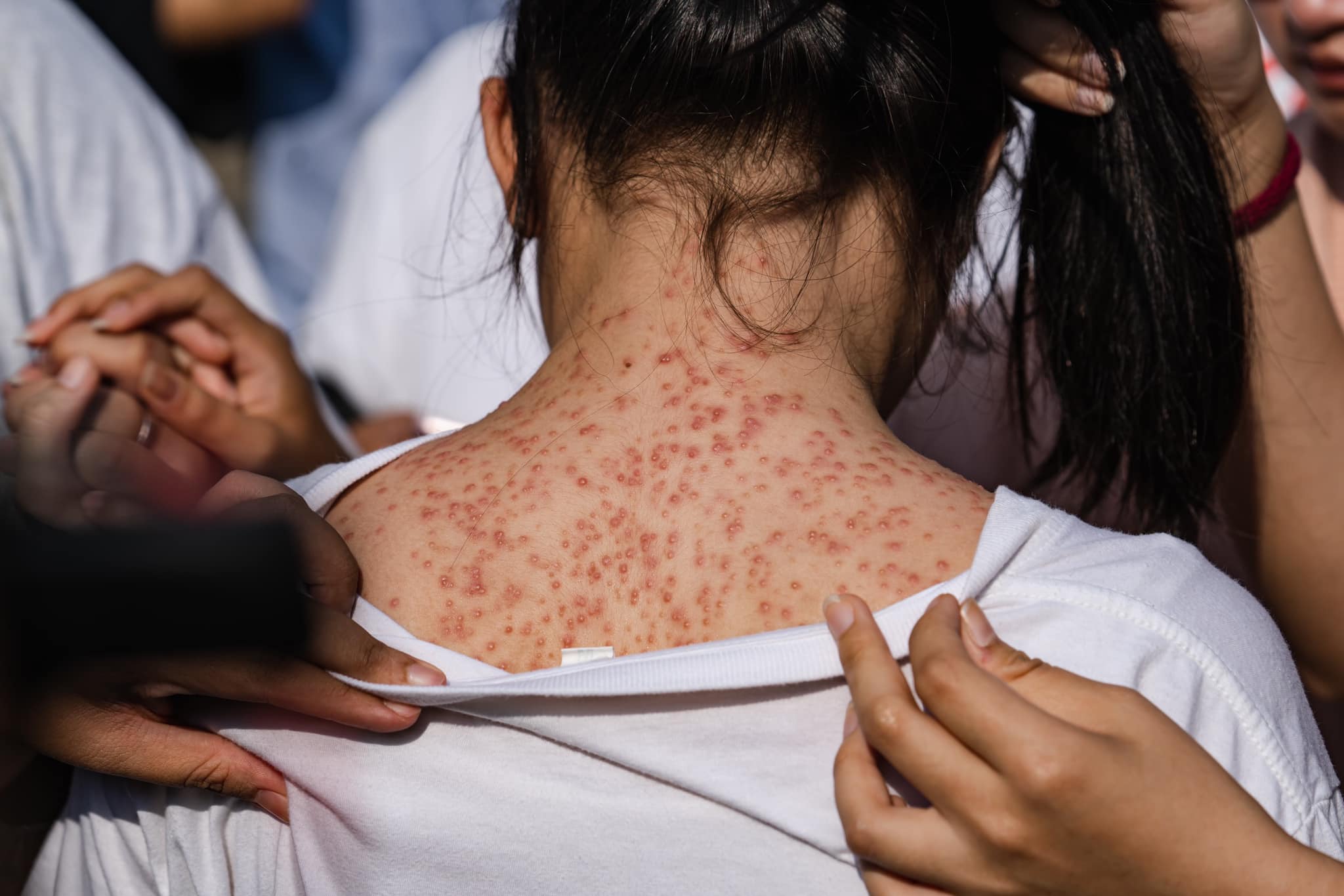
Credit: ไข่แมวชีส
Thailand’s Justice System
Children in conflict with the law are dealt with under Thailand’s child justice system. In particular, the Juvenile and Family Court has jurisdiction over criminal cases involving children. The child justice system in Thailand is required by the Juvenile and Family Court and Procedure Act to afford greater protection to children and ensure that “best interests” of the child are a primary consideration.
Arrest of Children
According to the Juvenile and Family Court and Procedure Act, a child cannot be arrested unless the child has committed a flagrant offense or unless there is an arrest warrant or court order against the child. When considering issuing an arrest warrant, the children’s court is required to pay special attention to the rights of the child, in addition to the child’s age, sex, and future, as well as the impact on the child’s mental well-being. Authorities must also handle the arrest of the child with great care, including but not limited to informing the child and their legal guardian of the arrest and their rights, and carrying out the arrest in a “gentle” manner.
Nevertheless, the unlawful arrest of 15-year-old Yok and the excessive and disproportionate force used against young “Thalu Gas” protesters, including the use of cable ties as instruments of restraint, rubber bullets, and tear gas, documented in this report reveals the violations of arrest procedure involving children by Thai authorities.
Detention of Children
Section 74 of the Juvenile and Family Court and Procedure Act allows detention of children only as a measure of last resort. In the context of the youth-led pro-democracy movement, many children have been charged and arrested in connection with the exercise of legitimate human rights activities. Although, in most cases, children are not subjected to detention at the pretrial stage or after having been convicted of a crime, this report discusses the various instances in which children have been detained as a result of their political activities, including children charged with lèse-majesté and children without parents or guardians, and the actions that TLHR child’s rights lawyer Ms. Khumklao Songsomboon has undertaken to advocate for the rights of these children.
Observation of Trials in Children’s Court
With the intention of protecting children’s right to privacy, Juvenile and Family Court and Procedure Act requires that trials of children are conducted behind closed doors only with relevant parties present, including parents and legal advisors. Although the law allows the court to use its discretion to permit trial observation by “other persons whom the court sees to be appropriate,” the court has, in almost all cases, denied children’s requests to have third parties present. This report discusses why the absence of independent observers and individuals whom children trust in the courtroom during trials risks violating children’s right to be heard and fails to account for the best interest of the child, who are often left feeling “alone” facing trial behind closed doors.
“Special Measures” or Diversion
In an effort to divert children away from formal involvement in the criminal justice system, a method known as diversion preferred by the UN Committee on the Rights of the Child, the Juvenile and Family Court and Procedure Act allows children in conflict with the law to enter “special measures” in lieu of prosecution or judgment. In simple terms, this means that children who have allegedly engaged in criminal acts can avoid formal involvement with the criminal justice system by entering into “special measures” instead.
However, this report reveals a variety of issues that persist within Thailand’s diversion program which restricts children’s rights rather than protects them. In order to be eligible for “special measures,” children are required to show “remorse” for their conduct by pleading guilty, and their confession can be used against them in subsequent legal proceedings. The opinions and interests of children are often not considered by authorities in the formulation of the child’s rehabilitation plan, which sometimes has taken place without the presence of the child’s lawyer, resulting in special measures that are inappropriate and inconsistent with the child’s best interests, such as meeting a lay judge that played songs glorifying the king, prostrating before one’s parents, and even urine drug testing. Even children who have entered “special measures” to avoid involvement in the formal justice system have ended up in detention as part of their diversion program, namely children originally charged with lèse-majesté.
Report Recommendations
To address the issues presented in this report and ensure that the rights of children in Thailand are upheld, From Classroom to Courtroom presents recommendations pertaining to 1) use of the lèse-majesté law against children and 2) the child justice system. In particular, the report to urges that the Thai government to:
- Drop all charges against children for exercising their rights to freedom of expression and peaceful assembly, especially the charge of lèse-majesté, and grant amnesty to the more than 280 children charged, prosecuted, and/or convicted under various repressive laws;
- End use of the lèse-majesté law against children, release all children currently held in detention for allegedly violating the lèse-majesté law, and amend Section 112 of the Criminal Code to bring it into conformity with international human rights law
- Refrain from arresting and/or detaining children unless absolutely necessary and only as a measure of last resort, and if an arrest and/or detention of a child must be carried out, ensure that the arrests and/or detention of that child are carried out in compliance with both domestic and international law;
- Guarantee children’s right to be heard in judicial or administrative proceedings affecting them by accepting children’s requests to have people whom they trust in the courtroom; and
- Remove the “confession” requirement for entering “special measures,” ensure that children’s confessions for their alleged wrongdoing are truly free and voluntary, consult children in addition to their family and lawyers in the formulation of a rehabilitation plan that includes diversion conditions developed in the “best interests” of children, and reform the diversion program to create a new system tailored to the specific needs and interests of child human rights defenders and activists.
Read our full report here.
